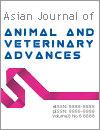基于GC-MS证据的印度兽医胃病药物体系草草
引用次数: 1
摘要
背景和目的:植物性药物是替代药物的组成部分,包括传统的印度和中国药物。特别是印度的悉达和阿育吠陀药物已经记录了使用各种草药治疗人类和动物的各种疾病。材料和方法:虽然这些药物处方已被今天的传统治疗师和从业者采用,但这些药物和配方被认为是在科学验证下被认可和接受的。许多药理学研究目前正在进行的理由和使用这些草药配方。植物化学调查已经进行,以列举这些草药的成分在悉达医学系统中使用。结果:采用气相色谱-质谱(GC-MS)技术鉴定了生姜和姜黄根茎、苦姜皮和姜籽对兽医动物胃病的潜在治疗作用。结论:文献中引用的药物用途与GC-MS鉴定的成分有一定的相关性,可作为兽药胃疾病的证据。本文章由计算机程序翻译,如有差异,请以英文原文为准。
GC-MS Evidence Based Herbocure from Indian System of Medicine for Stomach Disorders in Vets
Background and Objective: Plant based medicines are the integral part of alternative medicines including traditional Indian and Chinese medicines. Especially the Siddha and Ayurveda medicines of Indian origin have documented about the use of various herbs in treating various ailments of both human and animals. Materials and Methods: Although these medicinal prescriptions have been adopted by traditional healers and practitioners of today, these medicines and formulations are viewed under scientific validation for their recognition and acceptance. Many pharmacological researches are now underway for the justification and use of these herbal formulations. The phytochemical investigations have been undertaken to enumerate the components of these herbs used in Siddha system of medicine. Results: The present study focuses in identifying the underlying components using gas chromatography-mass spectrometry (GC-MS) which could contribute the healing effects of four herbal parts namely, the rhizome of Zingiber officinale (Z. officinale) and Curcuma longa, the bark of Terminalia arjuna and the seed of Piper longum in treating the stomach disorders of vet animals. Conclusion: The medicinal uses cited in the literatures are correlated with the components identified by GC-MS as evidence to the herbo-cure of stomach disorders in vet animals.
求助全文
通过发布文献求助,成功后即可免费获取论文全文。
去求助
来源期刊

Asian Journal of Animal and Veterinary Advances
生命科学, 兽医学, 基础兽医学, 动物学, 实验动物学
自引率
0.00%
发文量
21
审稿时长
2 months
期刊介绍:
Asian Journal of Animal and Veterinary Advances (AJAVA) is a high-quality peer-reviewed well indexed scientific journal publishing original research findings on all aspects of animal and veterinary sciences. Scope of the journal includes: Pathology, microbiology, parasitology, physiology, pharmacology, veterinary medicine, veterinary anatomy, poultry science, animal genetics and breeding, animal husbandry, animal reproduction and nutrition. Advances in boosting animal production, nutritional strategies, improving growth and production, management practices, genetic improvement, animal biotechnology and biochemistry, embryo biotechnology, veterinary public health and epidemology, countering both infectious pathogens and non-infectious diseases by employing modern diagnostics, vaccines, and effective prevention and control measures will be given priority.
 求助内容:
求助内容: 应助结果提醒方式:
应助结果提醒方式:


